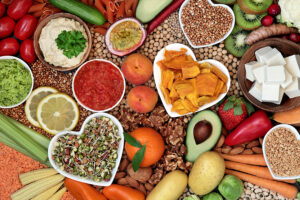This interview refers to the You Are What You Eat project which can be found in our Good Practices section.
GOOD PRACTICE OVERVIEW, CHALLENGES AND OPPORTUNITIES
What did you like the most about this practice?
One of the things I like most about the ‘You are what you eat’ practice is its focus on the power of nutrition in shaping our overall health and wellbeing. Overall, the ‘You are what you eat’ practice offers a proactive and empowering approach to health, focusing on the impact of nutrition on our wellbeing. A healthy diet can play a key role in preventing chronic diseases such as obesity, heart disease and diabetes. Adopting a ‘You are what you eat’ approach can lead to positive lifestyle changes such as regular physical activity, seeking nutrition education and developing healthier eating habits. By recognising the strengths of this practice, individuals can make informed choices and cultivate healthy eating habits that can positively impact their lives.
What did you like the least about this practice?
This practice also has its drawbacks; these include that it assumes a universal relationship between diet and health, ignoring individual differences and needs. The influence of psychological and emotional factors on eating habits is overlooked. Stress, eating in response to emotions, cultural and social influences and personal preferences all affect dietary choices and overall health. Specific health conditions or diseases may require special dietary interventions that go beyond the general idea of ‘You are what you eat’. For example, people with allergies, intolerances or diseases such as diabetes may need personalised diets.
How can this practice be improved in the future?
The practice of ‘You are what you eat’ has extraordinary potential for development and improvement in the future. One of these areas is to take a holistic approach. This means taking into account not only the nutritional aspects, but also the psychological, emotional and social aspects associated with our food choices. Personalising the practice of ‘You are what you eat’ is also important. Each of us has unique needs, preferences and health goals. It is therefore important to tailor dietary recommendations to individual circumstances and conditions to help people make informed dietary choices that are optimal for them.The availability and financial accessibility of healthy and nutritious foods is another area for improvement. Many people face difficulties in accessing fresh and healthy foods due to geographical or financial constraints. By working on this area, we can aim to make such products accessible to all, regardless of their financial situation or location.
Do you think your understanding of Food Literacy and sustainable food systems has been improved after implementing this practice?
Overall, the practice of engaging with users on topics of food literacy and sustainable food systems has positively contributed to my understanding and ability to provide valuable insights and information on these subjects.
Have you made any changes to your diet yet after implementing this practice?
Yes, since I introduced this practice, I have made some changes to my diet. I have started to be more conscious of what I eat and try to make better food decisions. I have increased my intake of vegetables, fruit and whole grain cereals, which are rich in nutrients. I am also trying to reduce my intake of processed foods and sweetened drinks.
In addition, I focus on consuming balanced sources of protein, such as plant-based alternatives to meat, beans, nuts and seeds. I also make sure my body is properly hydrated by drinking more water and avoiding sweetened drinks.
I have also introduced more variety into my diet, experimenting with new recipes and flavours. I try to discover local, seasonal foods to support local producers and reduce the environmental impact of transport.
These changes not only benefit my wellbeing, but also contribute to a more sustainable lifestyle. I am grateful for this practice, which has
helped me to better understand that I am what I eat and that my food choices matter for my health and the environment.
Do you have any ideas, how can sustainable food systems be promoted among young people/children?
Promoting sustainable food systems to young people/children is key to building a more sustainable future. There are several ways to achieve this. One is to introduce education and awareness about sustainable agriculture and food choices into school curricula. Teaching children about the importance of local and seasonal produce, reducing food waste and composting can help them understand how their food choices affect the environment. School gardens and farm-to-school programmes give children the opportunity to actively participate in growing their own food. Through this hands-on learning, children can connect with nature, gain knowledge about agriculture and experience the benefits of eating fresh, local produce. In addition, the organisation of cooking classes and food education allows children to learn how to cook healthily and reduce food waste.







